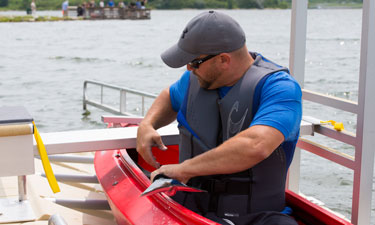 Before an audience of 150 onlookers and community supporters, the city leaders of Omaha, Nebraska, unveiled a milestone achievement July 18, 2014 — the 36,000-square-foot Universal Recreation Complex. The complex, situated on the scenic northwestern shore of Omaha’s Glenn Cunningham Lake, was introduced as a defining community resource, a space for individuals with disabilities looking to reconnect with their passions without boundaries or restrictions.
Before an audience of 150 onlookers and community supporters, the city leaders of Omaha, Nebraska, unveiled a milestone achievement July 18, 2014 — the 36,000-square-foot Universal Recreation Complex. The complex, situated on the scenic northwestern shore of Omaha’s Glenn Cunningham Lake, was introduced as a defining community resource, a space for individuals with disabilities looking to reconnect with their passions without boundaries or restrictions.
A year and a half prior to the park’s recent unveiling, the project existed only as a pragmatic idea belonging to Ed Armstrong, who coordinates adaptive sports and recreation for QLI, an Omaha-based national leader in specialized brain and spinal-cord rehabilitation.
“QLI’s goal is to build skills that transfer directly to a person’s life after they’ve graduated from our facility,” Armstrong says. “If we can cloak a functional physical therapy session within something that gives purpose to the specific person, then we’ve done our job.”
Armstrong routinely used Glenn Cunningham Lake to get rehabilitation clients out onto the water via adaptive kayaking. Despite the lake’s ideal, near-wakeless surface, the experience had proven difficult to facilitate. Wheelchair users required the full support of at least one able-bodied assistant to ford the grass and gravel near the shoreline. The terrain complicated access to kayaking on a fundamental level.
“That meant kayaking was something a person in a wheelchair wouldn’t be able to do independently beyond our rehabilitation facility,” says Armstrong.
Taking his experience to the Omaha Parks and Recreation Department in the spring of 2013, Armstrong proposed the construction of a universally-accessible floating kayak launch dock. Armstrong’s suggested floating dock was a sturdy and reliable module to help wheelchair users mount, launch, dock and dismount from their personal kayaks with ease and minimal assistance.
Omaha Parks and Recreation Director Brook Bench pursued Armstrong’s idea, and under Bench’s purview, the project’s ambitions grew. Bench understood the space was not meant only for individuals looking for a chance to get back to kayaking, but for families and groups who had members living with disability and injury. It was a space where those families could enjoy their favorite pastimes and create lasting memories as naturally and organically as possible. And rather than build an isolated, handicap-accessible station, Bench set out to create a permanent, fully integrated and universally functional fixture for the Omaha parks system.
“Ultimately, there was a need not being met in the Omaha community,” Bench says. “We had an opportunity to think big and to create something that would come with real benefit for the people of Omaha, whether they’re living with disability or not. It’s universal. It’s a park for everyone.”
With the plan in mind, Bench advocated for the project before the city’s philanthropic community. Support came quickly for the suggestions he and Armstrong put forth, and community donors and city leaders contributed $300,000 toward the project. In the spring of 2014, the full-fledged remodeling of the lake’s northwestern shore began.
By construction’s end, Omaha’s Universal Recreation Complex at Cunningham Lake offered two aquatic paddlesport launches, an artificial-turf bocce ball court, a horseshoe court surfaced with bonded rubber, newly paved paths connecting the park and its features to other locations around the lake, and a sheltered, shaded fishing pier for individuals living with spinal-cord injuries (who often cannot sweat or self-regulate their temperature below their point of injury). To further bolster easy, direct access, the City of Omaha placed a new road and parking lot in close proximity to the shorefront’s amenities.
On July 18, the renovation’s impact was unmistakable.
Travis Hasenkamp, a 37-year-old paralyzed from the waist down, was among the first to use the park’s adaptations. Utilizing a retractable transfer board built onto the floating dock, Hasenkamp used his upper-body strength to independently position himself into his kayak. Hasenkamp launched from the ramp with a single, graceful push, framed within a backdrop of sailboats gliding silently across the lake’s surface. Docking after a session on the water proved just as simple, and Hasenkamp dismounted from the kayak wearing a wide grin.
“I love kayaking, but I haven’t bought myself a kayak to use in an Omaha lake because there’s just no way for me to get it to the water myself,” says Hasenkamp. “This park changes that. It gives you back that sense of freedom.”
The park signals Omaha’s trailblazing push to be the standard for universal community accessibility, both within Nebraska and the nation at large, and marks the beginning of a larger initiative. Alongside a second phase of additions to Cunningham Lake — which, at present, include an archery range and an education-focused interpretive trail circling the lake — the City of Omaha, behind leadership like that of Bench, is keeping individuals with disabilities and their families a priority.
“When we’re moving on in the future, building playgrounds or parks, our intention is to make it all-accessible. When we build something, we want everyone to be able to use it. That’s our expectation now, to open the outdoors,” says Bench.
For Armstrong, the park stands as an immensely influential tool for QLI’s functional rehabilitation and the people QLI serves. But also, it is a physical totem of hope for an entire population — an interconnected experience for an interconnected Omaha community.
Armstrong says, “The ultimate feeling for someone who uses a wheelchair is to be out there on the lake doing something so liberating, to look back, and to see that they’ve been able to do so by completely leaving their wheelchair behind.”
Carsten Froehlich is the Corporate Communications Specialist for QLI.

